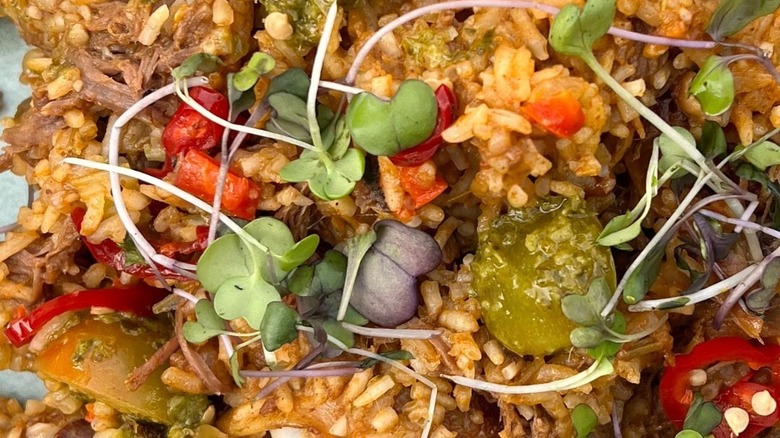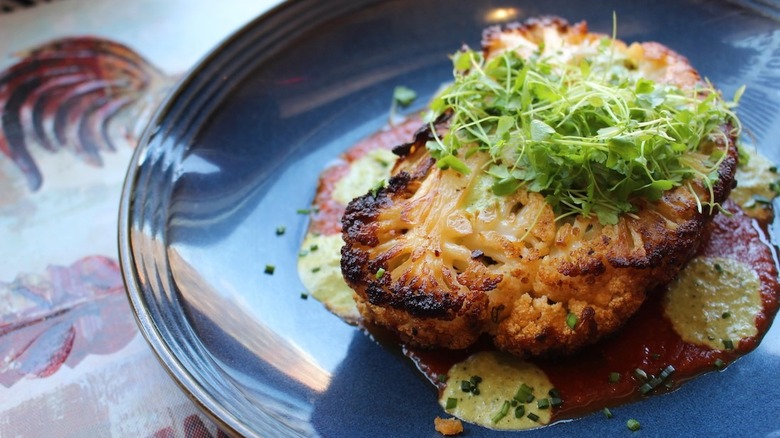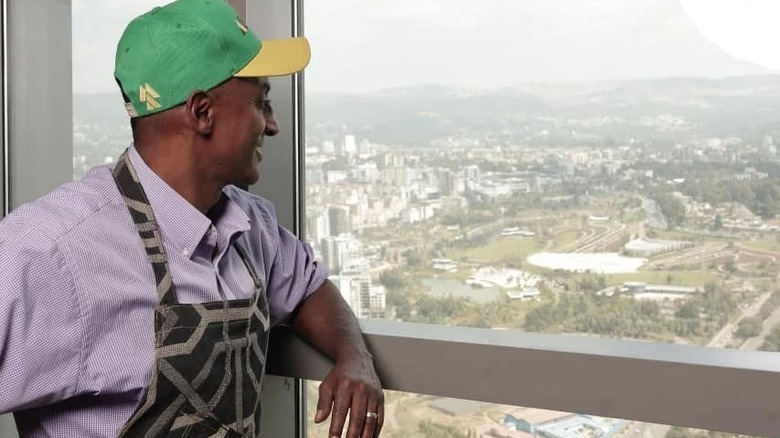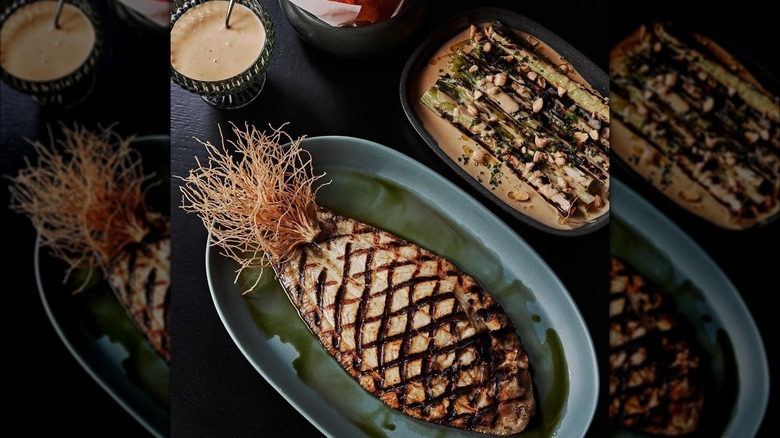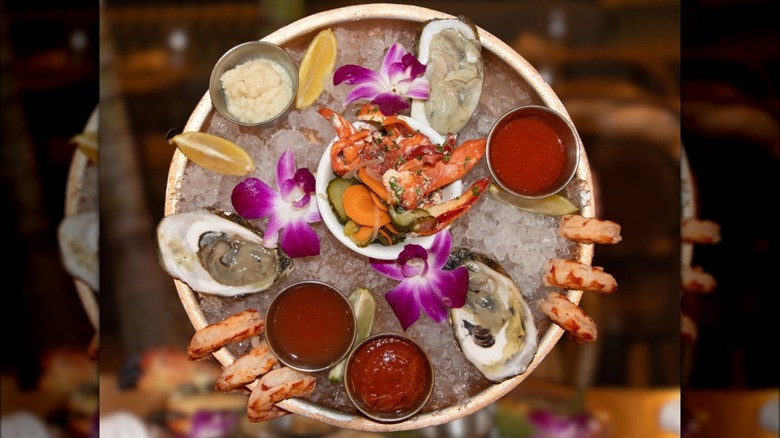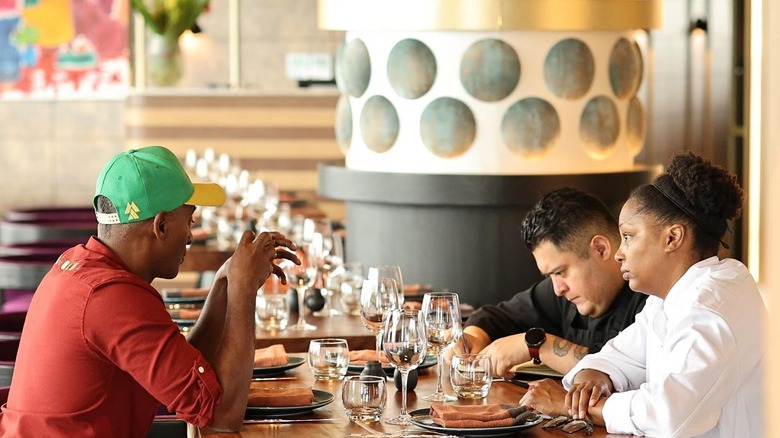Marcus Samuelsson On New Restaurant Marcus Addis, And What Black Excellence Tastes Like - Exclusive Interview
Marcus Samuelsson's cuisine is one of a kind, made up of a multitude of ever-evolving influences that shape his signature style. With restaurants dispersed across three continents and counting, Samuelsson's creativity and curiosity are constantly working. Most recently, the chef opened Marcus Addis in his native Ethiopia, an exciting prospect filled with potential.
Food Republic talked with Samuelsson in an exclusive interview so he could share more about this special moment as well as his recent and upcoming projects. Between opening Metropolis in NYC in the fall of 2023 and Marcus Addis at the end of the year, Samuelsson has continued creating new dishes and sharing his love of food. Red Rooster Overtown features a special menu for Black History Month, while the chef is already dreaming about springtime ingredients at Metropolis.
He'll be live in action hosting Overtown EatUp! On February 25, 2024, at the South Beach Wine & Food Festival (SOBEWFF). At the event, you can discover the culinary landscape of Overtown, Miami — the people and businesses that bring it to life. Beyond the next months, Samuelsson hopes to expand his repertoire to new cuisines and keep learning from the winning teams at his various restaurants. Read on for his thoughts about all the action.
Going to the heart of the SOBEWFF
What do you have planned for the Overtown EatUp! event?
Well, I mean, it's one of my favorite things of the SOBE festival and to highlight African-American businesses that are local in the community. It is just such a celebration. What I love about SOBE is that it now stretches into the neighborhood ... and the small businesses around there. We can highlight these businesses, and that was always the vision of EatUp! in Overtown too.
It's amazing to have the draw on the beach and it's amazing to have chefs from all over the country. But once those chefs are gone, the local businesses, how do they benefit? It impacts the Black and Brown businesses very, very differently. So for us to be able to do our event, highlight them before and after, is something that we take a lot of pride in.
That's fantastic, yes, that's a great point. Will you be serving classic recipes or are you trying something new for the event this year?
We'll serve some of the Rooster classics, we'll serve our fried chicken, our Jubilee rice, and lots of stuff because whatever we put on the menu sells out quickly so we then go in to get more stuff.
But it's more about — we're a host — what I look forward to is learning about a new business. Because it's not just about the food ... "How did that get going? Oh, you've been in business for 25 years, how can we support you?" ... It's really a conference in a way for small businesses. And when they start rubbing shoulders and talking to one another and then a year later do a popup together or help each other out in certain ways, that's when you see it's working.
The African diaspora on your plate
You're doing Black History Month at Red Rooster with a special menu. Can you share a little bit about what that's looking like?
Yeah, I mean, we feel like to celebrate it really starts [for] us with MLK weekend in January ... Our restaurants take special pride ... whether it's Red Rooster Harlem, or Hav & Mar, we do it of course in Atlanta and in Overtown as well — we really take pride and celebrate. These are conversations that each team has for a long time — showing off Black excellence, what it can look like, what does it taste like?
And every place is different. And I love the fact that in Red Rooster Overtown, for example, we focus a lot on the African diaspora. There's a difference, of course, between Ethiopian and Ghanaian food and doing that big menu graphically on a map so people can see it as well.
Right now it's the Caribbean week and you have Bajan-style Creole fish. You're serving it with cou cou, which is an unfamiliar ingredient for many people. Can you describe it and how you like to prepare it?
Yeah ... first of all, you think about West African food and how it came through the Caribbean and then came to America. As it has come to us, the recipe has changed a little bit, whether it's some people cook it with coconut milk, some people cook it with water, and some people have it in different ways.
And for me it's all about, here's the origin, it comes out of West Africa. And then keeping the recipes authentic but also modern in a way. And that for me, it's the fun of it. People know now about jollof rice, it's all over and through TV and stuff like that, but a lot of West African food is not that known. So bringing out something like cou cou is really, really fun.
Before cooking it does it come in a powder form?
Yeah, it's a powder that we then add in milk, almost like you cook a polenta. And then in Africa, obviously we eat it with hands and make it kind of like a ball form. And then you have sauce and the sauce very often in Africa throughout a lot of food is vegetarian, and then we eat animal protein on big holidays.
So the sauce is stewy and rich, whether you have peanut stew or okra. And then you can just dip that up. So it's a different style of eating and when you have animal protein it becomes the celebration. So it's not always served with a big piece of fish. It could just be the stew and the meal.
Make vegetables the star of your meal
On your menu at Red Rooster you have a jerk barbecue cauliflower and you give it sort of a meat flavor treatment. Are there other vegetables you like to treat as meat?
Yeah, I mean I don't think vegetarian food wins when you have to chase fish or meat as the outcome. You know what I mean? Vegetarian food is so delicious by itself, but I understand the similarities because we sear it the way we would sear a steak, so we get that really nice caramelization on it.
But for me, vegetarian food is so delicious by itself. It doesn't have to eat like meat, it doesn't have to eat like a tuna or a steak. It can eat just like a beautiful caramelized cauliflower where you get that natural sugar on top ... and it becomes softer inside. So the majority in the West, the majority in America, we always have this obsession where we compare it to meat. We don't have to, it can be just wonderful the way it is itself.
Marcus Addis takes it back to the roots
Congratulations on opening your first restaurant in Ethiopia, that must have been really exciting.
Yeah, it was very emotional and meaningful for us to be able to be connected with the school, to be able to give scholarships so young students can — after their work with us — be able to travel. I've been fortunate enough to be able to travel through food and it's transformed my life. To be able to give that back to my birth country — it's looking back and bringing the next generation with me and with the team — is something that we take a lot of pride in. We've done it for years here through C-CAP [Careers through Culinary Arts Program] and other endeavors, and to be able to do it in Ethiopia means a ton for my wife, and myself, and my team.
How did you approach creating the menu for Marcus Addis?
Well, first of all, we wanted to create a modern restaurant that had roots from Ethiopian heritage. But it's a modern restaurant, the way New American food became, so modern Ethiopian food is becoming. So the roots are the berbere, we use injera, we use the roots of Ethiopian cooking. But just like the building and tower are modern, so is our food. So it's almost like creating a new language. But we've been very fortunate, the team is doing great, the restaurant's really busy. It's a wonderful view; you're on the 47th floor, you can look out through it to the whole city. Any restaurant, it's a humble endeavor, right? There's lots of room to improve, but we also take a lot of pride in our work cause we know it's meaningful.
How do you see its role within the city's dining scene?
As you are on the top of the building, you can look out of Addis and you see it's a city in change. You have the traditional mom and pops that are the underbelly and the most important restaurants in the city. You have modern restaurants, new modern restaurants that have been there for only a couple of months or a year. So the landscape of hospitality is growing and I think that's important. If you looked back at how the New York food scene looked in the '90s versus what it looks like today, it's very, very different.
And Ethiopia's dining scene — food has always been very central in Ethiopia in terms of its culture and history, the way we eat with our injera bread ... Now we have tons of Italian restaurants, you have Chinese restaurants, and now you have something like Marcus Addis. So it's all adding and also it creates jobs, which is the most important thing.
Getting inspired by local ingredients
When you travel over there, are there some ingredients or snacks that you try to bring back with you to the U.S.?
Oh, absolutely. I love mar, I mean our restaurant Hav & Mar, Mar is Ethiopian for honey ... Honey is absolutely amazing. The coffee, of course, Ethiopian coffee, buna, it's amazing. Flax seed oil. There are a lot of ingredients in Ethiopia. There is fermented butter ... Sesame seeds, chickpeas. Ethiopia grows a lot of things that we like to use here. There's a chickpea flour called shiro that is absolutely amazing.
What do you like to do with it?
I cook it very simply, just in ginger, garlic, tomato, and water or stock so it becomes almost like a porridge. And then sometimes I do fritters of that ... or I use [it] at the beginning, maybe as a first puree on a sauce on a plate. And then maybe after that I match that with let's say cauliflower or apple or something like that.
Seasonal market dining at its finest
Your latest restaurant in New York, Metropolis, sounds quite exciting with its focus on farmers' markets and seasonal ingredients. Have you started thinking about plans for the spring menu?
Yes, Chef [Ed Tinoco] and I [talked] just last night. First, we sat down ... thinking about spring — our vegetable tower, that will change as right now we're in the middle of winter with our vegetables on that tower. So we treat it like a seafood tower, but with vegetables and dips instead. So obviously that will change as the farmers' markets change ... we knew being close to the markets was very important to us.
We are thinking about our spring onions. We are thinking about going out of sort of the heavier winter going into our spring, and eventually hitting the ramps, and later down soft shell crabs, and then even later rhubarb. But we're not there yet. We have a spring lamb dish that we're working on right now. We see lots of peas on the salsa verde that we are working on. So yeah, we definitely talk about it.
Valentine's Day is about coming together to share a meal
Lots of your restaurants are featuring a special Valentine's Day menu, is there anything among the selection that you're particularly keen about?
Well, I love that in a busy time that we have days like Valentine's Day. The people, they get time to first take their loved one out during a break. So that's just having a loving day, whether you can do it on the 14th or the 13th or the 15th. that week. We that work in the industry, we can't really do it that day, so we have to move a bit. But I do think about it as a loving week and all our restaurants will have Valentine's Day.
I think the key thing is to share your food, start with oysters, and make sure they get some chocolate in there or in the end somewhere. But shareable food like oysters is really fun for Valentine's Day. And it's a day of celebration, whether you are with a friend, your significant partner, or your family, just a little bit of love, more love. I think in a time like this it's what we need.
That's a good point. And if you're cooking Valentine's dinner at home, what will you be making?
Well, I'm not [laughs] but if I would do it, Ethiopian food is always great because you start with injera bread and you have these dips you are sharing.
Curiosity and growing with inspiring teams
Your restaurants combine a wide assortment of cuisines from around the world into your own signature style. Is there a particular cuisine that you haven't yet worked with that you're curious about?
Yeah, I mean, you nailed it. I mean for me, I'm in love with cooking and learning and the people behind the food. So my curiosity is just as big today as it was when I started when I was 16-17 years old. And I think that feeding your curiosity in food and having respect for food in different cultures. So I spent a lot of time in Japan, but I don't master it, but I'm always curious to learn more. I was in Laos and would love to know more about Vietnamese food and food from Laos, for example. [I've] been to Thailand a lot, but Laos and Vietnam are newer to me, so I'm like, okay, that's great, there's something to learn.
So for me, it's like every country, every culture has great food and we're just lucky as chefs to dive in and learn it. You live in New York very often there's a friend that comes from a part of the world that you're interested in. And learning it through a friend, whether that friend is a chef or not — one of the best ways to learn is to invite that person home and start cooking with them. You're getting some real good home cooking advice.
Any big projects you can give us a sneak peek of for the year?
I think opening in Ethiopia and coming off the success with Fariyal [Abdullahi]. We are very proud of Fariyal being nominated and in the final for Beard, and the success of Hav & Mar, and watching Metropolis and Hav & Mar becoming New York restaurants and pushing. I'm really proud of both teams.
It's such a privilege to work with two sets of teams that are very committed to making great food and creating great hospitality. Alexis, shout out to Alexis for our bar program at Metropolis, it is absolutely amazing and I'm completely blown away with her skills. I get such an energy working with young up-and-coming chefs and front-of-house staff that are so driven to excellence. So it's such a joy for me to work with them.
Marcus Samuelsson will be hosting the Overtown EatUp! event at the South Beach Wine & Food Festival, which runs from February 22-25 in Miami, Florida.
This interview was edited for clarity.



